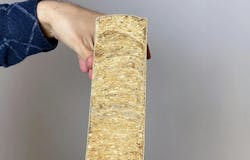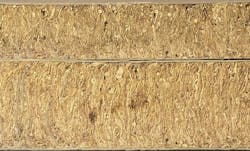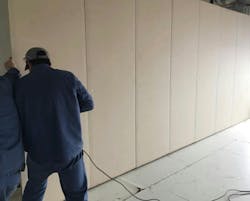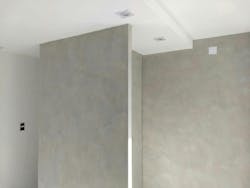Don’t Burn Straw—Build With It
After harvesting their rice and wheat crops, many farmers across the globe burn the straw that’s left on their fields. This practice accounts for 3.5% of global greenhouse gas emissions.
A Swedish startup called Our Ecolution has found an alternative to field burning. The company gathers straw that otherwise would go up in harmful flames and turns it into building boards.
“We’re turning waste into a resource,” says Matt Schneider, CEO.
Turning Straw Into Building Boards
Our Ecolution’s process begins by collecting the straw from fields. After it’s stored in a factory with a set humidity level, the straw is then fed into the company’s proprietary, patent-pending machines. With just the right amount of heat, pressure, and time, the machines compress the straw and transform it into dense boards, while the natural glues within the straw bond together during the extrusion process. The manufacturing process doesn’t require water.
The natural material boasts a host of benefits: a high level of sound absorbency, thermal insulation, fire resistance, and structural strength. The company has been researching its air filtration properties. And the dense boards can be installed without breakage, saving on material costs, Schneider says.
With a smooth, paintable finish, the boards can be used in place of drywall but also as exterior walls, subfloors, ceilings, and doors. While the boards can be produced in a range of sizes, a typical board is 2,400 millimeters (94 inches) long, 1,200 millimeters (47 inches) wide, 58 millimeters (2.3 inches) thick, and weighs 60 kilograms (132 pounds).
Using 10,000 tons of straw, one small Our Ecolution factory employing 15 people can produce 360,000 square meters (3.9 million sf) of boards and save 24,000 tons of CO2. If used at scale, the company’s product could start putting a dent in the environmental impact of the built environment, where just three materials—concrete, steel, and aluminum—are responsible for 23% of total global emissions.
As a sustainability-focused company, Our Ecolution plans to place its factories close to both its supply and demand. Its first factory will be located in Indonesia and is set to open on July 1; the second, in Uruguay, will open later this year. The goal is to source straw within 20 kilometers (12 miles) of its Indonesian factory, and within 50 kilometers (31 miles) of its Latin American factory.
“In the developing world, there’s a tremendous amount of wheat and rice straw, and there’s a tremendous amount of need for building materials,” Schneider says.
As the fourth largest rice producer in the world, Indonesia is particularly promising as Our Ecolution’s first market, Schneider adds—especially in light of the government’s push for affordable and sustainable housing. Through partnerships with local governments and developers, the company’s Indonesian factory will supply boards for a social housing program. In addition, Our Ecolution will enable Indonesia farmers to gain a third source of revenue from rice crops, following the rice itself and rice straw pellets, Schneider says.
Meanwhile, the company is also fielding interest from Europe and the United States. “We just focus on executing the boards, so we can scale at a quick rate,” he says.
The price of the product will depend on each local market. Schneider points out that the price will be lower in Indonesia, where an average factory salary is roughly US$250 per month plus housing, than in Europe or the U.S.
The origins of Our Ecolution’s product trace back to the 1930s, Schneider explains. At the time, a Swedish man, who’d created a straw-based product for insulation, moved to England and brought his product with him. During its wood shortage following World War II, England began using the straw boards for homes’ interior walls—ultimately using the product in over 300,000 houses, Schneider says. “They were using it out of necessity.” Our Ecolution, founded in 2018, has devised the fourth generation of this product.



